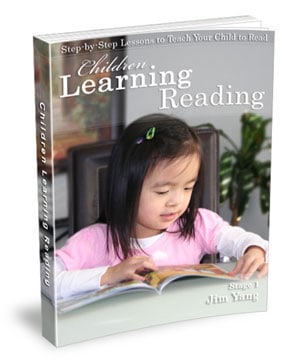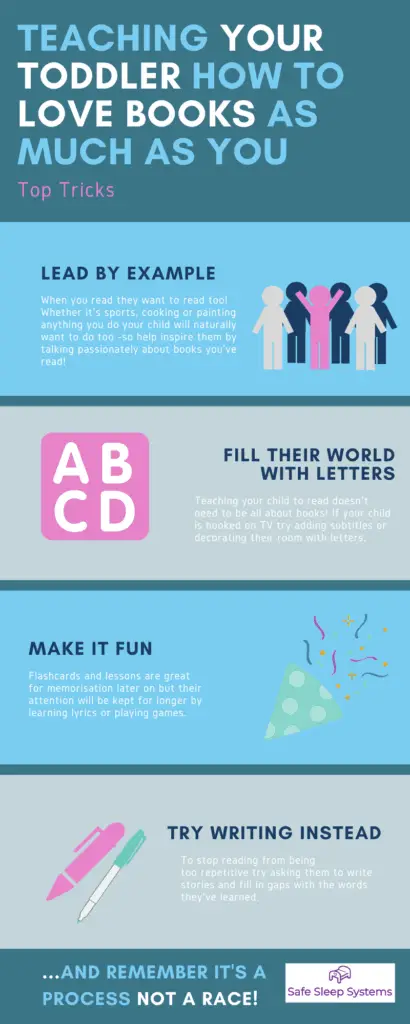Reading is fairly effortless for most adults. But, it’s a whole new challenge to tackle for kids. If you sense your kids are ready to learn how to read, that’s great! You don’t have to wait for their school to teach them!
Here is a quick guide on how to get started and let your children make their way into the world of literature. If your children are having trouble learning and need a little push in the right direction, this will help them as well!
Safe Sleep Systems is supported by its audience. When you purchase through links on our site, we may earn an affiliate commission, at no additional cost to you. Learn more
Lead by example
The most important source of knowledge for your children is already in their lives. It’s you. If you want your kids to develop or learn anything -a passion for sports , good manners or reading- you have to show them early on the importance of these things. It’s not about telling your kids they need to learn how to read because they might not understand it entirely.
, good manners or reading- you have to show them early on the importance of these things. It’s not about telling your kids they need to learn how to read because they might not understand it entirely.
You need to show them how important literature is for you and the world. Read every day, speak passionately about books and submerge yourself into literature as well. Without even trying, your kids will ask you about books and ask you to read books to them every day.
The first step to teach your children how to read is to spark an interest in them about literature. Otherwise, you will face an uphill battle, making it extremely hard to accomplish your goals — or worse: failing altogether and pushing your kids away from reading.
Live in a world filled with letters
Once you have fired up a little spark inside your little ones, you have to create an environment that allows your children to learn how to read. From early on, kids notice everything in their surroundings without knowing it. If your kid has their name on their bedroom wall, sooner or later they will ask you about it.
If you have a big library filled with books, sooner or later you will have a kid interested in it. You don’t need an expensive library to surround your kids with things for them to read. Books, magazines, e-readers, even subtitles will do the job! The more words available for your children, the better.
You can give a little twist to this as well. There’s an argentine writer who explained how he got a passion for books and learned to read early on: When he was a little kid, his aunt gave him dozens and dozens of books as a gift.
His grandfather didn’t like the idea of a kid reading grownup books, so he took most of them and hid them away. The kid couldn’t stop thinking about those books. He then waited for the right time to get ahold of those books and couldn’t stop reading ever since.
The idea of a forbidden activity will make your kids want to do it. Perhaps putting a couple of books on top of a “forbidden (or grown-up) pile” will spark huge amounts of curiosity that’ll turn into passion later on.
Make learning how to read be a fun thing to do
Many parents decide to try to teach their kids how to read before they have a chance to do it in school. That’s amazing! What they do not know is how kids learn how to read. Or how kids learn how to do anything. They don’t have the willpower to pay attention to lessons or cards for long enough.
But they have the energy to play for hours on end. If you want to teach your kid how to read, you need to turn it into a fun activity. There are more than enough games and puzzles you can use to teach your children how to read without them knowing what they are truly doing.
You should take advantage of music as well: Don’t try to make your kids memorize the alphabet, let them learn the words (or rather, letters) of the alphabet song. They’ll know it by heart before they could even memorize their ABCs in any other way!
as well: Don’t try to make your kids memorize the alphabet, let them learn the words (or rather, letters) of the alphabet song. They’ll know it by heart before they could even memorize their ABCs in any other way!

Make reading an interesting hobby, not a chore
This goes hand in hand with number three. Unless your kids can relate to the books you are giving them , there’s no way they’ll be invested in them for long enough to learn how to read. You shouldn’t force books on your kids, but rather try to get to know what they’ll love.
, there’s no way they’ll be invested in them for long enough to learn how to read. You shouldn’t force books on your kids, but rather try to get to know what they’ll love.
Whether it’s sports, dinosaurs or superheroes, you have to use what they love as a vehicle to teach them how to read. If they love dinosaurs, buy a couple of dinosaur books for kids with plenty of pictures to hook them and enough words for them to practice their reading skills.
This doesn’t mean you should bury them in kid books and hope for the best. But at first, you should let them read about things they love and progress to harder books later on. You will know as a parent when to let your kids go easy and when you should push them a little harder.
Ask a lot of questions
Make your children be constantly reading and reinforcing their learning process asking easy questions, inside your house and outside your home. If you are at home, you should ask them what does the TV says when the news is on. If you are in the supermarket, ask them to read a sign.
Keep them constantly engaged with letters, don’t let them wait for their reading time at night to do the practice. As long as they are engaged and reading, they are improving, no matter if it’s a 200-page book or a five-word sign on the side of the road. The more, the better!
Use apps and games on your phone or tablet
Children everywhere are now born with a phone in their hand. The internet, hundreds of videogames, and even more YouTube videos are what kids crave the most. As parents, we can take advantage of this early on. If your kids ask you for your phone or for a little tablet time, let them have it.
But be prepared! Download fun educational games that will make them practice different words and increase their reading ability. If they like these types of games, they’ll be learning and having a blast!
Of course, you have to remember this isn’t a replacement for books and overall practice, but it is great complementary work.
Let your child wander into literature alone
Even though we’d love to be with our children all the time, protecting them from anything that may harm them, there comes a time when we need to let them do things on their own.
When it comes to reading, there comes a time for this as well. Let them choose the books they want to read and let them stay in their room reading if they please. Of course, if they develop a passion for books -as we all hope our kids so- don’t let them read past their bedtime!
Reading is important, but so is sleeping.
Once your children start to (or attempt to) read by themselves, huge progress will start to happen. On this stage, you have succeeded as a parent as your kid will be constantly engaging with books and learning for the rest of their life, congrats!
Let your kid write as well
A lot of parents make a huge emphasis on reading and forget about an equally important thing: writing. Even though it might be harder to teach your children how to write than how to read -because of their untrained motor skills- both reading and writing help out each other tremendously.
Once your kid grabs a pen and a piece of paper and, huge improvements are soon to be made.
At first, your children will write every word they remember by memory. But soon after, your kids will truly learn how to write. And they will have to carefully choose each letter and understand how each word is crafted.
To understand the sounds of each letter and how they interact with each other is a huge milestone in reading, but a hard one to achieve. If you decide to teach your kid how to write as well, that milestone will be achieved effortlessly.
Know when to start
Every parent wants their children to excel in things. Learning how to read is an important goal in children’s lives, because -as everyone knows- reading is a crucial skill in modern life. But that doesn’t mean you have to rush your children into it. You have to understand you need to wait for the right time for your kid to start learning.
Maybe your friend’s kids did learn to read by age 3, but perhaps your kids will learn at 5 years old. It’s not a problem and it isn’t an indication of intelligence either. Until they are over 18 years old, kids are developing. And different people develop different traits in different moments of their lives.
You should try to teach your kid how to read early on, at 2 years old if you want, but you need to understand they might not be ready to learn. And that’s okay.
Understand it’s a process, not a race
If your children show enthusiasm or predisposition to learn how to read, that’s great! But it won’t happen overnight. Even though we, as adults, can read effortlessly, it’s a whole new world for our little ones.
Take your time to explain the obvious and repeat the words as much as it’s needed. It might take days, weeks or months for your kids to start reading out loud.
But it’s worth it.

